Thomas Wharton's Blog, page 15
May 22, 2012
A curious cartographic story
On Exactitude in ScienceJorge Luis Borges
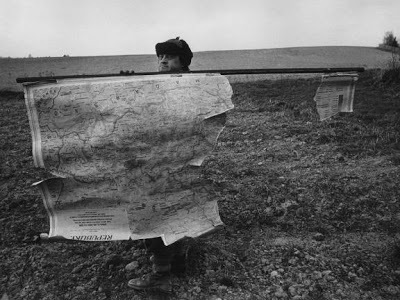
. . . In that Empire, the Art of Cartography attained such Perfection that the map of a single Province occupied the entirety of a City, and the map of the Empire, the entirety of a Province. In time, those Unconscionable Maps no longer satisfied, and the Cartographers Guilds struck a Map of the Empire whose size was that of the Empire, and which coincided point for point with it. The following Generations, who were not so fond of the Study of Cartography as their Forebears had been, saw that that vast Map was Useless, and not without some Pitilessness was it, that they delivered it up to the Inclemencies of Sun and Winters. In the Deserts of the West, still today, there are Tattered Ruins of that Map, inhabited by Animals and Beggars; in all the Land there is no other Relic of the Disciplines of Geography.
Suarez Miranda,Viajes de varones prudentes, Libro IV,Cap. XLV, Lerida, 1658
From Jorge Luis Borges, Collected Fictions, Translated by Andrew Hurley. Penguin Books 1999.
Image from http://cllctr.com/view/e256f32862067e...

Published on May 22, 2012 11:59
May 18, 2012
Waiting for the stone
Based on a true story
I’m twelve years old. I get up before anyone else that morning and I leave the cabin and go down to the lake. It’s a very small, round lake, more of a pond, at the bottom of a steep-sided bowl of spruce and pine-covered hills. The sun’s just coming up and there’s a swathe of fog on the water, which is as still as glass.
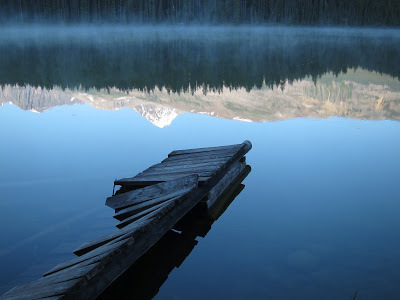
I look down at my feet and here is a stone. Pale grey. Flat, disk-like. Perfect for skipping.
I pick up the stone. The lure of that calm mirror of water is too great. I cock back my arm, take a breath, then flick my wrist and the stone flies true. Plip plip plip … three bounces and then the white missile vanishes in the fog. I don’t hear a final splash and I don’t get to see if it bounced more than three times.
This is disappointing, and I keep staring into the fog, as if there might be something more to see. And then I hear it.
Plip, plip, plip … the stone reappears, skipping toward me, a tiny flying saucer, dropping with a plop into the water just in front of me.
I stand dazed for a moment. The far shore of the lake is still invisible. I don’t know who threw back the stone, if anyone did. Maybe the lake returned it. Or the fog. Or in this moment the world has become like the lake’s surface, a mirror, and if the fog cleared I would see myself standing on the far shore, having just thrown the stone.
If it is my stone. I reach down and fish the stone out of the shallows. Yes, it is the same flat gray disk, or it seems to be, but somehow it’s different. This is the one stone that came back when all the others didn’t. This perfect Paleolithic button. Now it’s more than a stone. It’s a sign. A word. A message. A beginning.
And then my twelve-year-old self is back in this grown-up body and I’m sitting at my desk, looking down at my writing notebook. I’m not holding the stone anymore, I’m holding a pen.
I hold the pen over the page for a moment, and then it descends and I start to write.
I write, waiting for the stone to come skipping back over the water.

Published on May 18, 2012 07:36
May 16, 2012
Story, cubed
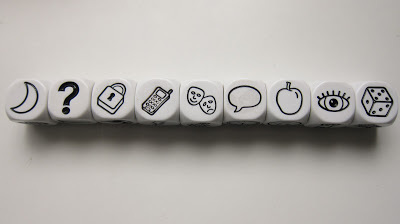
A story created with Rory's Story Cubes:
I waited until the moon rose.
Then there was enough light to find my way through the swamp to the hut of the witchy woman, so that I could ask her to tell my future.
When I got to the hut I knocked on the door but there was no answer. I tried the door. It was locked. The moon went behind a cloud and I could barely see a foot in front of me. Then I remembered the cellphone in my pocket. I took it out and turned it on.
By the screen’s light I could see the witchy woman standing near me. I jumped in fright and dropped my phone.
“You want to know your future?” the witchy woman said. One of her eyes had a red pupil that glowed in the dark. “You want to know if your life is going to turn out a comedy, or a tragedy, or something else entirely?”
I swallowed hard and nodded.
By the dim moonlight just coming out from behind the clouds, I saw the witchy woman cup her hand around her mouth and whisper a word. Then she held out her cupped hand toward me, as if she was carrying something in it.
“Hold out your hand,” she said. I did as she asked, and she placed whatever was in her hand in mine and closed my fingers around it.
“Here’s your answer,” she said. “Wait until you get home to open it. And never come back here again.”
I turned and hurried away, stumbling in the near-dark. When the moon went behind clouds again, I tripped over something and fell forward. I opened my hand to break my fall, and I heard the witchy woman’s prophecy drift away on the wind so quickly that I could only catch a few words before they faded: “... once you've bitten the apple ...”
Panic swept over me. I got up and ran. I stumbled and fell again, and again. I had no idea where I was. After a while I saw a light in the distance. Some farmhouse, I thought. I ran toward it. Then I realized it was the witchy woman’s hut. I had been running in circles.
She had told me never to come back, so I didn’t dare knock on the door. But I couldn’t help looking in the window. The witchy woman was sitting at a table on which stood a burning candle. She had a single die in the palm of her hand. She rolled it across the table. I couldn’t see what number it landed on, but it seemed to please the witchy woman. She smiled, then she blew out the candle.
All I could see now was her red eye. It turned and looked right at me.
I ran.
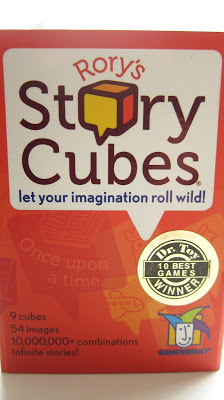

Published on May 16, 2012 07:51
May 14, 2012
Riddle
What is Riddle? A shapechanger, a creature of Story without a story of his own. He (if Riddle is a he) hid for years in the Forest of Eldark, waylaying travelers and forcing them to play his crazy riddle game, in the hope someone could tell him who or what he really is and where he came from. Those who saw him or were lured by him into his hidden grove in the forest called him the Woodwraith and feared him. Some said he was a bat, others saw him as an owl, and others as a wildcat climbing among the tree branches. As a shapechanger, of course he could be any of these creatures and more.
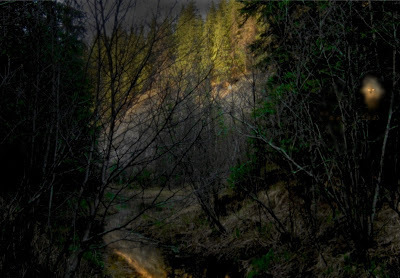
Riddle can take on the characteristics of whatever creature he shapes himself as. As a cat, Riddle is convincingly catlike, and yet there remains something uncanny and strange about him.
Can this creature of many shapes be trusted?

Published on May 14, 2012 07:28
May 11, 2012
The Marrowbone Brothers
There were three of them to begin with: Tuck, Hodge and Flitch. Three little pigs. When they were still quite young their mother drove the brothers out of the muddy wallow that had been their home, and they had to fend for themselves.
They got on well for a while, but then a garm-wolf picked up their trail and began to stalk them.
Tuck was killed by the garm-wolf, and Hodge and Flitch went on without their older and wiser brother. They might have been all right in the end, but something else happened to them on their travels: the two remaining Marrowbone Brothers got too close to an outbreak of werefire, and it changed them. It turned them into creatures of malice and hunger. It changed them from talking pigs into hogmen, vicious trolls with an appetite for human flesh. And it was in that form that Will Lightfoot encountered them in the sewers under the city of Skald.
"Will looked up and had to suppress a cry of horror at the faces staring back at him – two bloated, hideous faces with tiny close-set eyes and turned-up snouts glistening with slime. The faces belonged to large, bloated man-like creatures that looked almost exactly alike, right down to the clothes they were wearing: patched rags that had apparently once been fine suits of dark maroon velvet. There was even some dirty lace still poking out of the cuffs of their sleeves, and tattered white wigs were perched on their massive heads. The only difference Will could see between his captors was that one was slightly less fat than the other and had a long, ugly scar running from his forehead to the corner of his mouth. This one lunged forward and prodded Will in the chest with a dirty finger. His breath reeked like rotting meat. Will’s stomach churned."
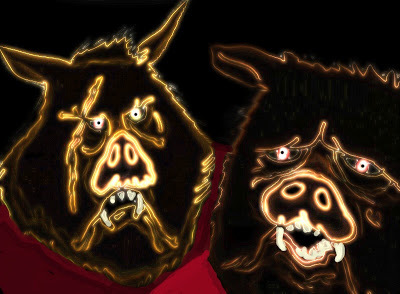 Add caption
Add caption
Published on May 11, 2012 06:55
May 8, 2012
Maurice Sendak
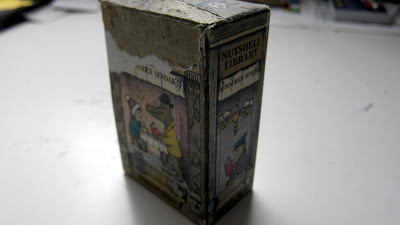
The Nutshell Library ... read, reread and loved to pieces at our house.
Maurice Sendak 1928 - 2012
Thank you, Mr Sendak!

Published on May 08, 2012 12:58
May 7, 2012
House hunting
Somewhere west of Edmonton, or maybe Calgary …

They’d left the last Starbuck’s behind hours ago.
Past the last streetlights and the last fire hydrants the realtor led them. Through the outermost subdivisions and beyond, into unknown territory. There was no pavement here, only grass and bushes and trees, and wet, boggy patches you had to be careful not to step in. There was wind and the stirring of leaves and the twittering and calling of birds. There was no sound of traffic. No city noise at all.
“Where the heck is she taking us?” the husband muttered to his wife.
“You’re the one who hired her,” the wife whispered.
“I’m hungry,” the boy whined.
The realtor said nothing. She pressed on, stopping every now and then to tilt her head and listen, or sniff the air. She led the family into a thick grove of aspens. The sunlight flickered through a spangle of leaves.
“Does she even know where she’s going?” the husband growled.
The boy bent down and lifted something from the grass. It was a mottled blue and brown egg.
“Put that back,” said his mother. “You don’t know where it came from.”
The boy put the egg back in the grass. They moved on. The undergrowth was getting thicker, harder to push through.
Suddenly the realtor dropped to one knee. She turned and beckoned the family to her side. They joined her in a crouch. When they were all together the realtor inched forward slowly and they followed. After a few moments of this she parted the undergrowth in front of them and pointed.
In a quiet sun-filled clearing before them, about three hundred metres away, stood four houses.
Wild houses. They shone with newness.
“Single family,” the realtor murmured as if to herself. "Attached garage … cathedral ceilings.”
“They’re perfect,” the wife whispered, and put her arm around the boy.
“Which one are we gonna get?” the boy asked eagerly.
“I don’t know about this location,” the husband said, slapping at a mosquito on his arm.
The realtor turned to them and put a finger to her lips. She slipped the big sports bag off her shoulder and slowly unzipped it. From inside the bag she took a very large and complicated-looking gun.
“Which one are you going to shoot?” the boy asked.
The realtor didn’t answer. She lifted the gun to her shoulder and sighted the closest house through the scope. The wind rose. It carried the scent of warm shingles, of sawdust, fresh paint and PVC to the realtor's nostrils.
The wind shivered the tall grass in the clearing, but the houses didn’t move. It was clear they hadn’t sensed any danger. The realtor could feel the fear, hope and anticipation of the three people behind her, urging her on, but it did not rattle her. She was in the zone. After the bullet would come the access roads, the streetlights, the strip mall ... and it all started right here. In this moment.
“Congratulations,” the realtor said, and fired.

Published on May 07, 2012 07:41
May 3, 2012
Letters to a Young Writer: The Pilot Light
In the last letter I talked about those times in writing when you get stuck, or bored, and you either don’t know how to proceed or you just don’t feel like it, and you give up.
I said that making a daily habit of writing can help you through those times. It’s like keeping a pilot light lit for a furnace. The pilot light keeps burning all the time so that a bigger fire can be ignited quickly and easily when needed.

A habit of daily writing keeps the creative flame alive during those times when you’re stuck and the writing isn’t going well, or hardly going at all. Eventually the ideas and the inspiration and the energy will come back. And they’ll probably come back sooner if you keep a pilot light on.
Something else that helps is faith.
Over the years I’ve learned to trust the creative process, to let it work rather than trying so hard to control it and make it work . There are days -- lots of days -- even now when I can’t see my way forward or I get bored and tired of something I’m working on. But I’ve discovered that even at those times, the creative process is still going on in a part of my mind I can’t consciously access or control. I’ll get dejected and feel like I’ve got no ideas, no inspiration, and then one day a fresh new idea will suddenly pop into my head. It always seems as if it came out of nowhere, but really it came from all the work my mind was doing “behind the scenes.”
That’s what I mean by having faith. Keep at the writing, and those moments of inspiration will come.
For some other thoughts on how to spark ideas for writing, see my post on five important questions for writers (and other creativepeople).

Published on May 03, 2012 07:01
April 30, 2012
Letters to a Young Writer: Getting Stuck
In earlier letters I talked about what to do if you want to write but you don’t know how to get started or what to write about. Sometimes (and for some writers, all the time) that’s not a problem. You know what you want to write and you don’t have any trouble getting started. The ideas and images and words just flow out onto the page, and it’s great.
Then you hit the Swamp.
That’s what I call the place that you come to as a writer where you get bogged down and stuck. You stop. You don’t how to go on, or you don’t feel like it. Trying to write feels like trying to walk through waist deep concrete that’s quickly hardening.
You give up.
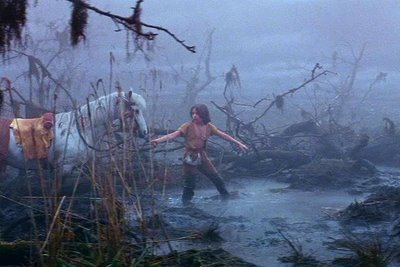 As a young writer I spent a lot of time in the Swamp. As a teenager I already knew I wanted to be a writer, but the problem was I couldn’t seem to finish anything I wrote. I’d have an idea and start off on a wonderful wave of writing energy but soon the energy would run out and the story would sit there, unfinished.
As a young writer I spent a lot of time in the Swamp. As a teenager I already knew I wanted to be a writer, but the problem was I couldn’t seem to finish anything I wrote. I’d have an idea and start off on a wonderful wave of writing energy but soon the energy would run out and the story would sit there, unfinished.So how do you keep going? How do you get out of the Swamp?
First thing is to figure out what it is that’s stopped you. Sometimes the problem is that you can’t see where to go from here. You’ve come to a blank in the plot. Or sometimes you do know the ending, but you lose interest in the story as a result (if you know how it’s going to turn out, why bother writing it?). Or maybe you stop simply because writing is such hard work and you’re sick and tired of it.
The good news is that you can make use of the Swamp. Getting stuck and blocked and stopped are all natural parts of the writing process. Sometimes they happen because we really need to take a break. We need to stop and step back and take a wider look at what we’re doing.
So if you can’t keep working on a particular story for whatever reason, then let it sit for a while. That’s fine.
The key is to keep writing something.It took me a long time to learn this, but making a daily habit of writing is crucial.
Write every day. Even if you only have the time for a few sentences. Even if you feel like the worst writer that ever lived. The story you're working on may be stuck, but that doesn't mean you are. Work on something else and you won't stay in the Swamp very long. I’ll offer some more thoughts and strategies on getting stuck and how to get unstuck in the next post.

Published on April 30, 2012 06:53
April 26, 2012
Storylives
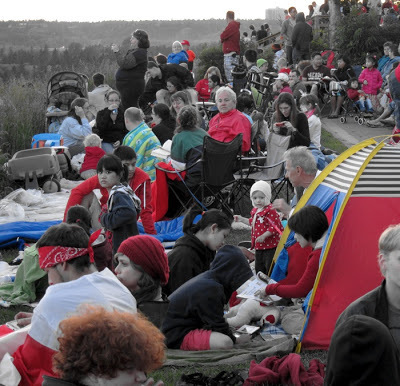
People say that what we are all seeking is a meaning for life. I don't think that's what we're really seeking. I think what we're seeking is an experience of being alive.
-- Joseph Campbell
And this may be one of the reasons human beings in every culture, through all time, have told and loved stories. Sure, stories can instruct us in how to behave, and provide explanations for the way things are, but there's also something in stories that isn't about meaning. We don't read or listen to stories, or watch stories on movie and television screens only in order to extract a meaning from them, but to have more life. To make our own lives wider, deeper, richer, by experiencing the lives lived by people in stories. With stories we get to live many lives, many lifetimes, within one.
Photo: Canada Day, Edmonton, by T Wharton

Published on April 26, 2012 23:27



